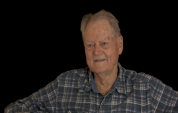4:42 | Bill Livingstone was lucky he had no problems with his feet on the forced march from one prison camp to another. As they marched further into Germany, a guard let slip the somber news that FDR had died. The men arrived at Stalag VII-A, the largest of all the POW camps. There, he had a memorable chat with a British prisoner who had been there since Dunkirk.
Keywords : Bill Livingstone Prisoner Of War (POW) feet malnourished Franklin D. Roosevelt (FDR) Stalag VII-A Munich Germany Moosburg turban Royal Air Force (RAF) English London England

He failed his first eye test because of color blindness, but at the next level a sympathetic officer allowed Bill Livingstone to enter the Air Corps. Eventually he did get disqualified from pilot training, but they decided he'd make a fine aircraft mechanic.
"Be kind to your web footed friends...." Bill Livingstone couldn't believe that the sergeant had never heard that song. He was in a two month wait for aircraft mechanic school to start. Gunnery school was next and they made an instructor out of him. He watched his friends leave to join crews and go overseas. Finally, he was going.
He crossed on the Queen Elizabeth with thousands of others, zig-zagging their way to Scotland. Bill Livingstone was a gunnery instructor who was sent off to an RAF base for more schooling. On that trip, he got to see the sights of London.
He bunked with regular B-17 crew members, but Bill Livingstone was a gunnery instructor who was there to keep skills sharp. He was also there to substitute for any crew member who was not able to fly. His very first mission turned out to be a memorable one. Part 1 of 5.
When the bombs were released, the B-17 sharply rose in the air, then banked right. Bill Livingstone heard a loud pop and that's when two engines were knocked out. They were losing speed and altitude fast and they didn't know where they were. The decision was made to dump the Norden bombsight and he watched it fall into the darkness below. Part 2 of 5.
Right after he dumped the Norden bombsight into the night sky, Bill Livingstone saw the co-pilot blow the hatch and tumble forward into the air. The rest of the crew followed and were strung out in a line when they landed in a farmer's field. He approached them angrily and that's when they found out where they were. Then, the Wehrmacht showed up. Pat 3 of 5.
It was the most miserable night of his life. After bailing out over Germany, Bill Livingstone was captured and being held in a stable with his crew mates. Following a very cold night, they were taken to an interrogation center. Part 4 of 5.
Bill Livingstone was taken into an office where a German officer greeted him warmly and promised him he would be housed in a very comfortable camp. All the captured airman had to do was help him fill out a form and answer a few questions. Right. Then it was off to Stalag Luft IV. His first mission was finally over. Part 5 of 5.
Stalag Luft IV was a huge POW camp full of captured airmen from America and England. Bill Livingstone remembers how there was nothing to do between roll calls. Fortunately, the Salvation Army and the Red Cross sent books, sports gear and food to the prisoners.
Christmas came to Stalag Luft IV in 1944 and the Germans allowed the prisoners to cut Christmas trees for the barracks, though there was little to be had in the way of decorations. Bill Livingstone recalls how the men in his room came up with an improbable holiday cake.
They could hear the sound of Russian guns approaching from the east, so the Germans decided it was time to leave the POW camp in Poland. Bill Livingstone was one of the throng of prisoners packed into old boxcars and sent into the interior of Germany. One night, the train rolled to a halt in a large rail yard. He was surprised to see where they were.
Allied POW's were being sent further and further into the interior of Germany. Bill Livingstone arrived at Stalag XIII and found an incredible array of nationalities. Again, the sound of approaching guns meant the prisoners would be moved, this time on foot. He and his buddies brought along an unusual item they hoped to trade for food.
Bill Livingstone had only been at his third prison camp about a week when the guards disappeared. Patton's tanks could be heard nearby and, soon, one crashed through the front gate. Liberation had come and it wasn't long before the men were enjoying coffee and donuts at Camp Lucky Strike.
Though he had been a POW, Bill Livingstone had such a late entry into the war that he didn't have enough points to be discharged. He worked in a personnel office until the time came. He pays tribute to his friends who didn't make it, along with the many others who made that sacrifice.